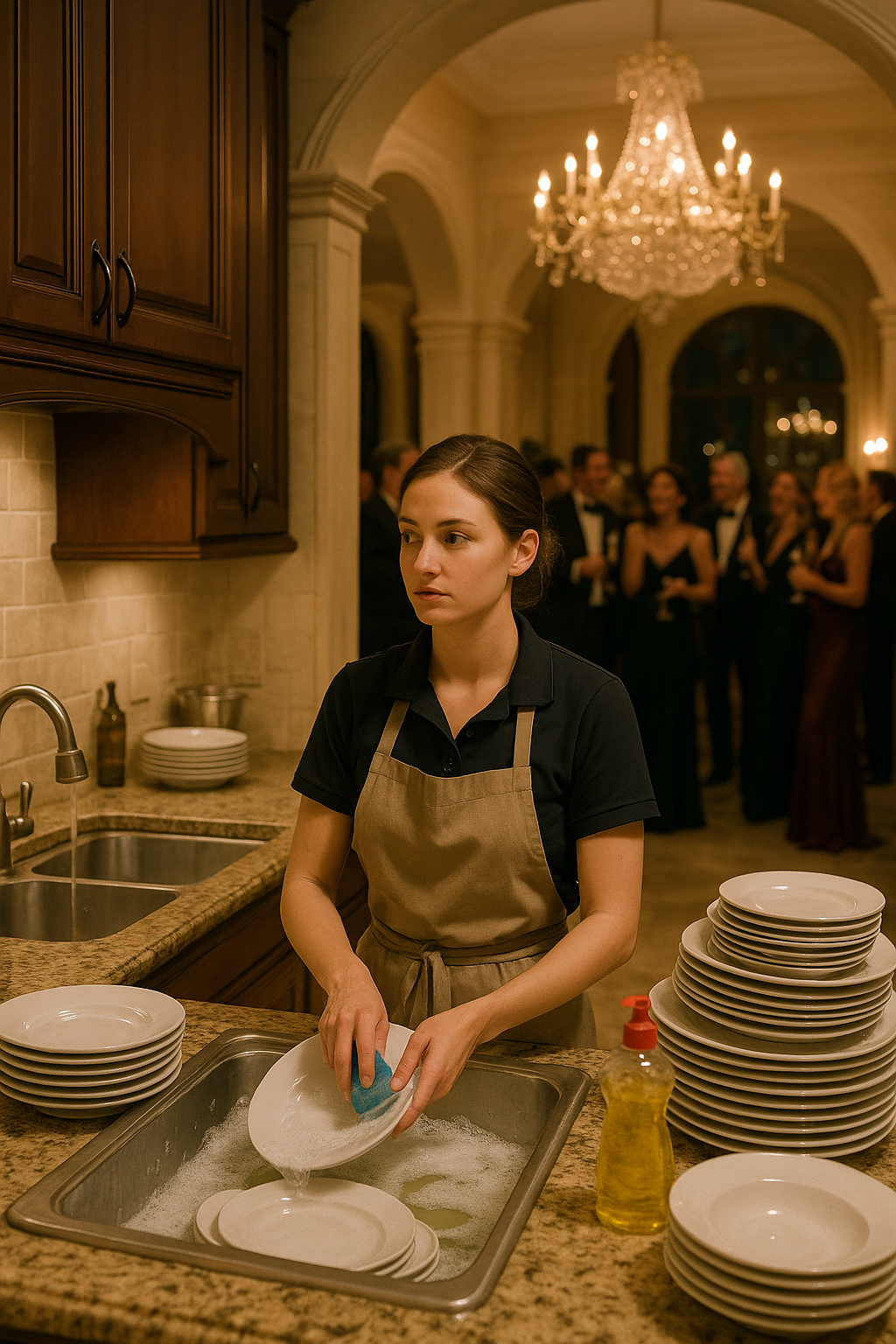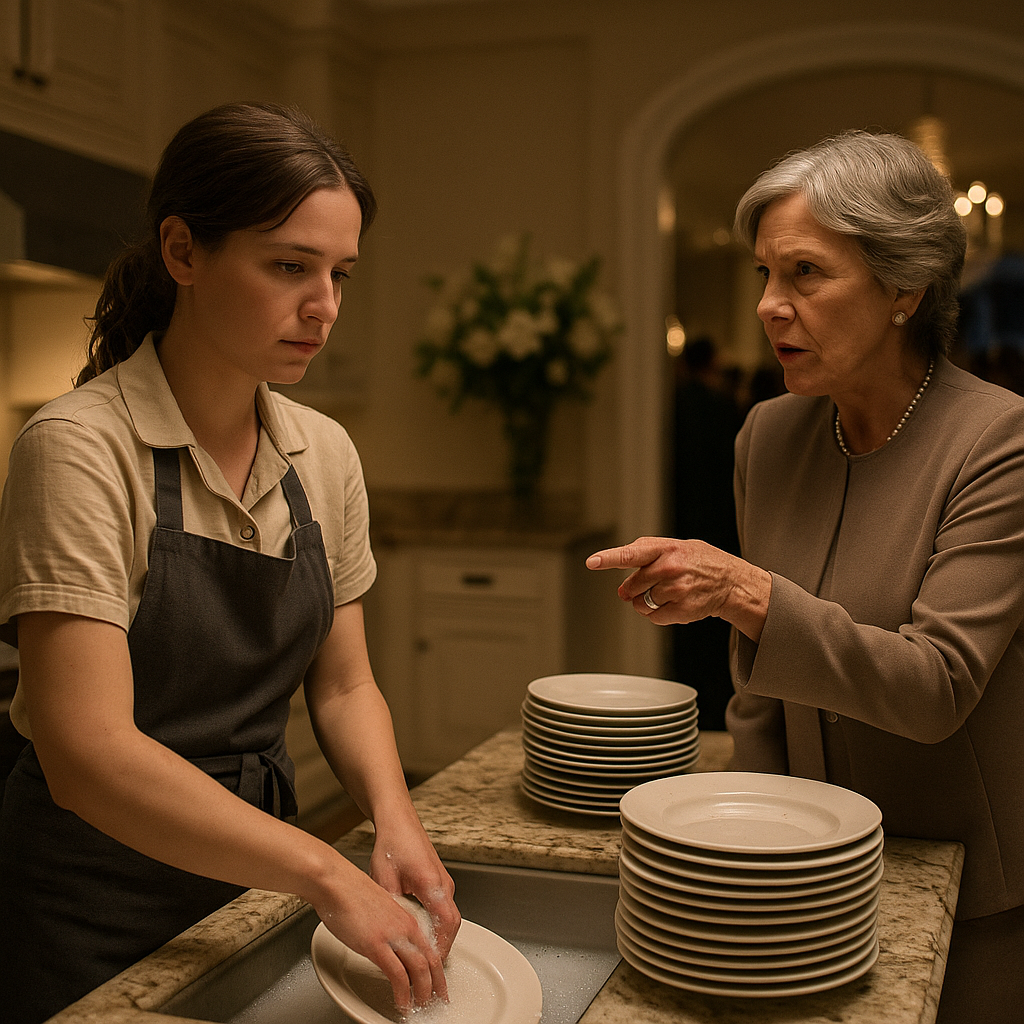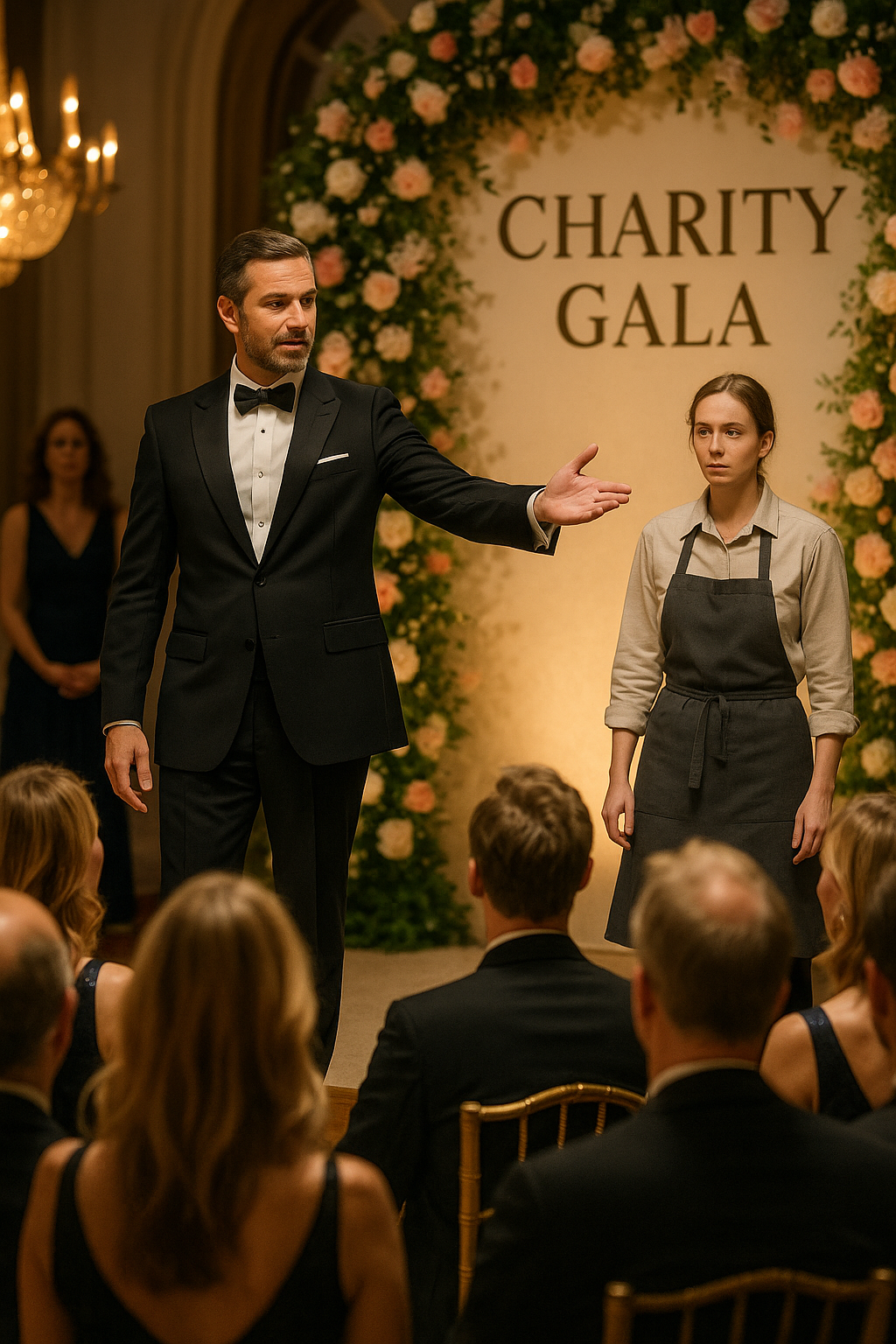My name is Tessa Cross. And two hours ago, I was standing in my own kitchen with rubber gloves on, sleeves rolled up, and hands submerged in warm soapy water. A tower of dirty dishes beside me. My hair tied back into a tight bun, my face bare of makeup, my feet aching from a long night of pretending I was someone I wasn’t.
The funny part? Just a few floors above, in the grand ballroom of our mansion, hundreds of glittering guests mingled under crystal chandeliers. They sipped champagne, laughed too loudly, and posed in front of the custom floral wall that spelled out “The Cross Foundation Annual Gala.”
It was my home. My event. My life. And yet, not a single one of them recognized me.
Because I didn’t want them to.

I wasn’t wearing a designer gown or diamonds that night. No, I’d borrowed a uniform from our catering staff—a black polo shirt, slacks, and a plain apron. I slipped into the kitchen before guests arrived and joined the flurry of preparations unnoticed.
Why?
I needed to see something. To know something. Nathan—my husband—had told me for weeks how fake the people in his circle could be. How some smiled at him and sneered behind his back. How charity events sometimes attracted more ego than generosity.
So I decided to test it myself.
I wanted to know who these people really were… when they thought I was just “the help.”
It started off small. One woman in a crimson satin dress clicked her tongue impatiently when I took more than five seconds to find the right wine.
“You people should be trained better,” she muttered, not even looking me in the eye.
“You people.”
A phrase that hit harder than it should have.
Then came the event planner, Sasha—someone we’d paid handsomely to organize the gala. She waltzed into the kitchen, her headset bouncing as she barked orders at everyone like a drill sergeant.
“Hey! Apron girl!” she snapped at me. “Table six needs water. Why are you just standing there?”
I bit back a response and quietly obeyed. As I walked through the crowd, I heard whispers and laughter behind my back. Some guests barely noticed me. Others glanced over and then quickly turned away, like I wasn’t worth the space I occupied.

An older woman—I think her name was Eleanor, one of the so-called “socialite darlings”—called me over near the dessert table.
“You’re too slow serving the shrimp,” she said flatly. “Don’t they teach basic coordination anymore? And for heaven’s sake, smile.”
I smiled. Politely.
She squinted at me. “Actually, never mind. Go help with the dishes. You look more suited for that anyway.”
Dishes.
In my own house.
Where my wedding photos hung in the hallway, and my favorite painting—Nathan’s gift on our anniversary—decorated the stairwell just behind her.
Still, I nodded and returned to the kitchen.
And that’s where I stood, scrubbing plates, listening to music from the ballroom drift down like a cruel reminder of where I should have been.
I was almost ready to leave the act behind
I didn’t expect kindness. I wasn’t looking for praise.
But what I saw in those few hours was heartbreaking. People who wore compassion on their sleeves when cameras were on, but snapped their fingers like royalty when they thought no one of importance was around.
I had always believed charity was about heart. But tonight, it felt like performance.

Then, just as I stacked the last clean plate, I heard a familiar voice echo through the hall:
“Excuse me… has anyone seen my wife?”
I froze.
Nathan.
His tone was casual, but there was an edge to it. A deliberate volume.
I peeked around the kitchen entrance just in time to see him stepping into the ballroom in a crisp tuxedo, holding a glass of champagne. He looked… magnetic. Confident. Powerful. And slightly annoyed.
“She was supposed to meet me by the dessert table twenty minutes ago,” he said louder, as conversations began to quiet.
Sasha, the planner, rushed to him, flustered. “I—I haven’t seen her, Mr. Cross.”
Eleanor stepped in, adjusting her pearls. “Oh, perhaps she got caught up? You know how wives can be.”
Nathan smiled tightly. “I suppose. Though it’s strange—because I thought she might be downstairs… helping with the dishes.”
There was silence.
You could hear the chandeliers humming.
Then he turned toward the kitchen—and spotted me.
In full catering gear. Hands wet. Face flushed.
And he smiled.
“Ah. There she is.”
The crowd turned as I walked up beside him.
Nathan gently took off my apron, dried my hands with his pocket square, and kissed my forehead in front of everyone.
“This,” he said, “is Tessa. My wife. The woman this gala was dedicated to. The woman who helped me build this house, this life, and the foundation you’re all here to support.”
You could’ve heard a pin drop.

I looked around and saw wide eyes. Paled faces. Eleanor’s mouth was slightly open. Sasha dropped her headset.
“Wait—she was… in the kitchen?” someone whispered.
“She was… washing dishes?”
Nathan turned to the crowd again.
“She chose to spend the evening as one of the staff. To see the event from a different view. I didn’t know she was going to do that, but I think it’s pretty brilliant.”
He paused, looking around.
“And from what I gather, not everyone passed the test.”
A few people began avoiding eye contact. Sasha excused herself awkwardly. Others tried to laugh it off, but their nervous chuckles said enough.
Nathan took my hand and led me onto the stage.
“I want to say one thing,” he said. “Tessa may have worn a different outfit tonight, but she never stopped being the most important woman in this room. And if anyone treated her like less than that—you might want to take a long look at yourself before calling yourself charitable.”
It wasn’t a scolding.
It was truth.
Raw, honest truth.
And for once, people listened.
When the guests had left and the ballroom was quiet again, Nathan and I sat on the steps at the back patio.
“I’m sorry,” he said, holding my hand. “I didn’t expect it to be so… cruel.”
“I needed to see it,” I whispered. “Not for you. For me. I think I just needed to remember why I value kindness more than money or status.”
He kissed my hand.
We stayed there in silence, under the stars, the mansion glowing behind us.

I woke up to hundreds of messages. Some from our guests, apologizing. Others from strangers online who had heard the story—it had spread fast. Apparently, someone had recorded Nathan’s speech and posted it.
It had gone viral.
People praised the message, the test, and the reminder that true character is revealed not in how you treat the powerful—but in how you treat the seemingly powerless.
The Cross Foundation received double the donations the next day.
Sasha quit. I heard she’s opening a bakery and “learning humility.”
Eleanor? She sent flowers. Twice.
And me?
I kept the apron. It hangs in my closet now, next to my gowns. As a reminder.
That once upon a time, the richest woman in the room was the one washing dishes—and watching.
Because Kindness Is the Real Wealth.


